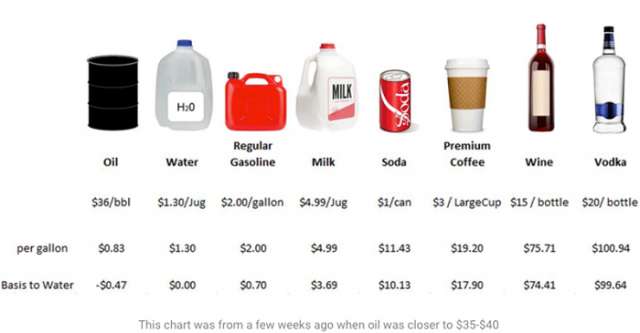Does oil need more attractive packaging and a sexy image to sell?
Oil is now cheaper than bottled water, Bloomberg TV reporter David Ingles noted last week. In fact, with West Texas Intermediate trading under $30 per barrel, it is over 60 times cheaper than a bottle of Perrier sparkling water, which costs $1,850 by his calculations. Ultimately ground water that is filtered and processed into an attractive package driven by image could point to a solution for crude producers. Perhaps they should hire one of the many talented PR firms to boost the “attractiveness” of oil?
Patrick DeHaan, who muses about the energy complex using the Twitter tag @GasBuddyGuy, was quoted observing the much discussed storage problem from a different angle. He said that a single barrel of WTI crude is 3 times cheaper than a steel drum to put it in. Other oil analysts have actively discussed oil storage capacity constraints being reached, raising the specter of so much supply on the market that there would no longer be any storage space left, thus forcing sales at even cheaper prices.
Nonetheless, if the oil industry has the right image built, perhaps oil can in fact become “sexy” and the packaging might change? Or perhaps the forces of supply and demand are a common theme found in nature, happening all around us? The Chinese might disagree with this concept because they would be instructed to do so by a controlling government, but if they think about it similar logic is found in Confucius, if pointing to such an old school of thought is allowed by the thought police.
In a lake, in a forest, in a grocery store or with oil eventually supply and demand finds balance
Supply and demand in oil sometimes has odd ways of working itself out. Just as the gas station selling $0.47 automotive stimulus could only stand the pain of selling for so little for so long – he quickly raised the price within a day of the dramatic, below market price tactic – the supply picture is likely to modulate, asseveral market reports have noted the line where price and profit intersect. Obviously regulations are needed to make sure the most powerful are not allowed to abuse the system. There is a balance in the force.
There is a point where humans make free market decisions without even acknowledging it. A choice to shop at Target over the corner neighborhood store is a free market decision that ultimately impacts supply of such small business in an economy. Regulations can’t intercede in that free market event, but when any force becomes monopolistic in their price control, regulators have historically entered the picture.
Sometimes the decisions are complex, sometimes not.
Extended to an asset such as oil, when the price drops below $30 @BrandonLockhart notes two pizzas can be purchased for the same price. Would he rather sink his teeth into chewy goodness with an underlying foundation of tomato sauce, or would oozing black slim be the best choice for his monetary attention?
“It’s surely only a matter of time before a barrel of crude oil will be cheaper to buy than a pint in a London pub,” @DerekJMurray tweeted, pointing to the most illuminating decision a free market can adjudicate on the topic.
More about:
























-1745485667.jpg&h=190&w=280&zc=1&q=100)























